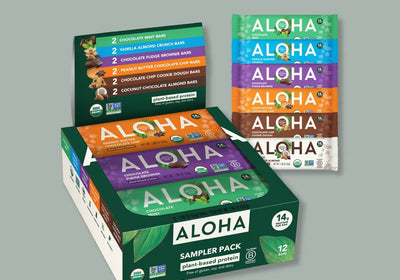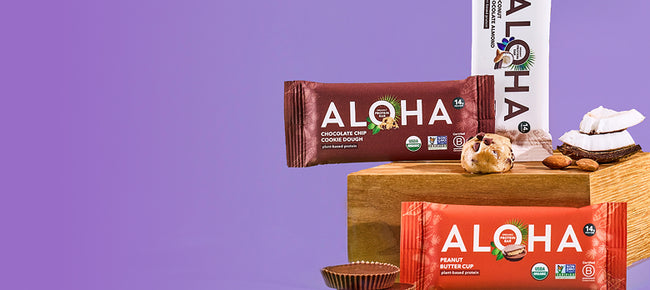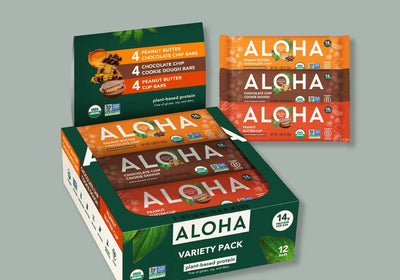
 collection header image
collection header image
 collection header image
collection header image
Protein Bars
-

-

Peanut Butter & Cookie Dough
Variety Pack12-countThree best-selling classics, one delicious variety pack
Price: $36.99
4.9Rated 4.9 out of 5 stars301 ReviewsPeanut Butter & Cookie Dough
Variety Pack12-count -
 Limited Edition!
Limited Edition!Peppermint White Chocolate Protein Bar
12-countCoated in white chocolate and topped with crunchy peppermint bits
Price: $32.99
4.8Rated 4.8 out of 5 stars679 ReviewsPeppermint White Chocolate Protein Bar
12-count
What Are Vegan Protein Bars?
Vegan protein bars are snack bars made entirely from plant-based ingredients. They don’t contain animal products, meaning no dairy, eggs, or honey. Instead of whey or casein (common in traditional protein bars), vegan protein bars use plant-based protein sources like nuts, seeds, brown rice protein, or pea protein. This makes them a great option for people following a vegan lifestyle or simply wanting to incorporate more plant-based foods into their routine.
What sets vegan protein bars apart isn’t just the absence of animal products—it’s also the types of ingredients often used to create them. Many brands, like ALOHA, focus on using organic and recognizable ingredients. That could include organic nut butters, coconut, oats, and chocolate chips. The result is a bar that aligns with plant-based values and emphasizes ingredient transparency and simplicity.
People enjoy vegan protein bars for all kinds of reasons. Some like having something quick and easy to grab between meals or after a workout. Others appreciate having a snack that fits their dietary preferences without compromising flavor. Whether living a fully vegan lifestyle or looking for new ways to snack more consciously, vegan protein bars can offer a satisfying and straightforward choice.
What Ingredients Are Commonly Used In Vegan Protein Bars?
Vegan protein bars are known for their simplicity and focus on plant-based, recognizable ingredients. These bars often avoid artificial additives and animal-derived components, making them appealing to those looking for a clean, plant-forward snack. Here’s a breakdown of the ingredients you’ll often find in vegan protein bars:
- Plant-Based Protein Sources: Instead of animal-based protein like whey, vegan protein bars use alternatives such as brown rice protein, pumpkin seed protein, or pea protein. These sources are popular because they blend well into the bar while contributing to a satisfying texture. They offer a plant-based way to include protein without relying on dairy or eggs.
- Nut and Seed Butters: Nut and seed butters like almond, peanut, and sunflower seed are frequently used as a protein source and a way to create a creamy, cohesive texture. These butters help hold the bar together and add a rich, natural flavor. They’re also a great alternative to processed binders or fillers.
- Whole Food Ingredients: Many vegan protein bars include ingredients like shredded coconut, cocoa powder, or dried fruits to add variety and flavor. These additions give the bars more character while keeping the ingredients simple and familiar. They also contribute to the bars' visual appeal and natural texture.
- Natural Sweeteners: Rather than using refined sugars or artificial sweeteners, vegan protein bars typically feature natural sweeteners like coconut sugar or tapioca syrup. These options add just the right amount of sweetness without overpowering the other ingredients. Many bars avoid sugar alcohols, which can be harsh on digestion for some people.
- Real Flavor Additions: Ingredients like chocolate chips, sea salt, cinnamon, and vanilla extract are often used to give vegan protein bars their signature flavor. These components are usually included in their natural form and without synthetic flavor enhancers. They’re chosen to complement the bar’s base ingredients and make each bite enjoyable.
Are Vegan Protein Bars Healthy?
Many people consider vegan protein bars a convenient and straightforward snack option. They’re often made with plant-based ingredients and without artificial additives, which appeals to those looking for simpler food choices. Here's what typically makes them a popular option among health-conscious consumers:
- Free from Animal Products: Vegan protein bars are made without animal-derived ingredients like dairy, eggs, or gelatin. This makes them a suitable option for individuals following a vegan lifestyle or those who prefer to reduce their consumption of animal products. It also means they often skip common allergens found in traditional protein bars.
- Simple and Organic Ingredients: Most vegan protein bars feature easy-to-recognize ingredients such as nuts, seeds, oats, and natural sweeteners. Brands like ALOHA highlight their use of organic, non-GMO components with a focus on quality. This approach can help consumers feel more confident about what they’re eating.
- No Artificial Additives: Vegan protein bars are often made without artificial flavors, colors, or preservatives. Instead, they rely on natural ingredients for taste and texture. This makes them appealing to those who try to avoid overly processed foods.
- Dairy-Free and Soy-Free Options: Many vegan protein bars are free from animal products and avoid common allergens like dairy and soy. This makes them more accessible to individuals with specific dietary needs or preferences. Bars like those from ALOHA clearly label these attributes, making it easier for shoppers to find options that fit their lifestyle.
- Portable and Convenient: Vegan protein bars are often used as an easy, on-the-go snack. They don’t require refrigeration and come in individual packaging, making them ideal for busy routines. Whether you’re heading to work, traveling, or running errands, they’re a convenient way to keep something plant-based on hand.
Who Should Eat Vegan Protein Bars?
Vegan protein bars are a versatile snack that can work for many people. Whether fully plant-based or just trying to add more variety to your diet, these bars are designed to be simple, satisfying, and easy to include in your day. Let’s look at who might enjoy them most:
People Following A Vegan Lifestyle
Vegan protein bars are crafted specifically for individuals who avoid all animal-derived ingredients in their diet. They provide a satisfying, protein-rich snack that supports a plant-based lifestyle's ethical and nutritional values. They seamlessly integrate into a vegan daily routine because they exclude dairy, eggs, and other animal-based components.
Anyone Looking For Plant-Based Snacks
You don’t need to fully commit to a vegan diet to enjoy the benefits of vegan protein bars. Many people reach for them simply to increase their intake of plant-based foods in a convenient and tasty way. These bars make transitioning into healthier snacking habits easy without overhauling your diet.
Busy Individuals Who Want A Grab-And-Go Option
Vegan protein bars are ideal for people with full schedules who need quick, portable snacks throughout the day. They don’t require any preparation and can be easily stored in a purse, backpack, office drawer, or car. This makes them a smart, time-saving choice for anyone who wants to stay fueled while on the move.
Those Who Prefer Simple Ingredient Lists
Many vegan protein bars stand out for their short, transparent ingredient lists that feature whole foods. Instead of focusing on ingredients like nuts, seeds, dates, and natural sweeteners, they tend to avoid artificial flavors, colors, and preservatives. This clean-label approach appeals to consumers who want to know exactly what they’re putting into their bodies.
People With Dietary Preferences Or Food Sensitivities
Vegan protein bars are often formulated without common allergens such as dairy, soy, and gluten, making them safer for people with food sensitivities. Many brands clearly label their products, making it easy to identify which bars meet specific dietary requirements easy. This allows individuals to snack confidently while sticking to their health needs or food restrictions.
How Do Vegan Protein Bars Compare To Regular Protein Bars?
Vegan protein bars and regular protein bars serve a similar purpose, but they’re made with very different ingredients. While both are designed to be convenient snacks, the source of protein and the overall ingredient profile can vary quite a bit. Here's a closer look at how they compare:
- Protein Source Differences: Regular protein bars often contain whey or casein, which are dairy-based proteins. Vegan protein bars, on the other hand, use plant-based proteins such as brown rice, pea, or pumpkin seed protein. This makes vegan bars a dairy-free alternative for people who prefer or need to avoid animal-based ingredients.
- Ingredients and Additives: Many regular protein bars use artificial flavors, preservatives, or sugar alcohols to enhance taste and shelf life. Vegan protein bars often skip those and focus on more recognizable whole-food ingredients. They tend to have simpler, shorter ingredient lists, especially brands like ALOHA that highlight organic and non-GMO ingredients.
- Dietary Compatibility: Vegan protein bars suit people following plant-based, dairy-free, or vegetarian diets. Depending on the brand, they also often accommodate additional preferences like soy-free or gluten-free. Regular bars may not always meet these dietary considerations.
- Taste and Texture: Taste and texture can vary between the types, but vegan protein bars are often praised for having a softer, more natural consistency. Because they use nut butters, oats, or coconut, the texture may feel more like a baked snack than a chewy or taffy-like bar. Some people prefer the less processed feel of vegan options.
When Is The Best Time To Eat A Vegan Protein Bar?
Vegan protein bars are flexible and easy to fit into your day whenever you need something quick and plant-based. They're often a convenient snack when you're short on time or between meals. Here are a few moments when people tend to reach for one:
- On the Go: Whether you’re rushing out the door for work, errands, or appointments, having a vegan protein bar on hand ensures you won’t go hungry. Since it doesn’t require refrigeration, heating, or prep, it’s perfect for tossing in your bag or keeping in the car. This level of grab-and-go convenience is incredibly practical for those with packed schedules or last-minute plans.
- Between Meals: There are moments during the day when you’re not quite hungry enough for a full meal but still need something to keep you going. A vegan protein bar offers a quick and satisfying solution without the effort of cooking or deciding on more involved options. It’s the perfect fix for mid-morning cravings, afternoon slumps, or late-night munchies.
- Before or After Activity: After a brisk walk, gym session, or spontaneous hike, your body might need a quick source of energy and recovery. Vegan protein bars provide a light, plant-based option to help refuel without feeling too heavy. Many people also eat them beforehand for a small energy boost, especially when there’s no time for a full meal.
- During Travel or Outdoor Activities: Traveling—by plane, train, or trail—can often limit your access to fresh, plant-based food choices. Vegan protein bars are compact, mess-free, and shelf-stable, making them ideal companions for long road trips, camping, flights, or outdoor adventures. Keeping a few within reach means you won’t have to compromise your eating preferences or settle for processed vending machine fare.
- As a Quick Snack at Work or School: Busy days filled with meetings, classes, or back-to-back responsibilities don’t always leave time for proper meals. Vegan protein bars are discreet, easy to stash in a desk or backpack, and offer the right fuel to keep you going. They’re a dependable choice for anyone who wants to stay focused and nourished without stepping away from their workflow.


